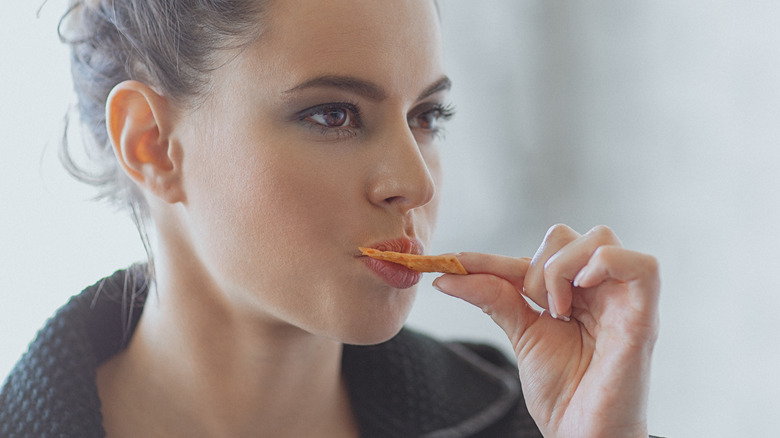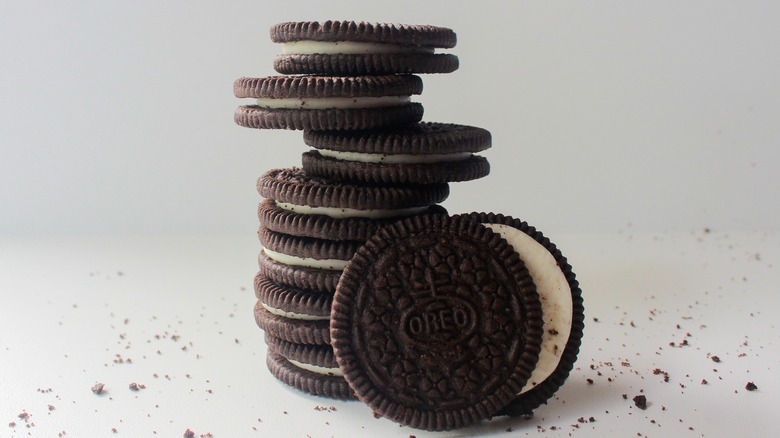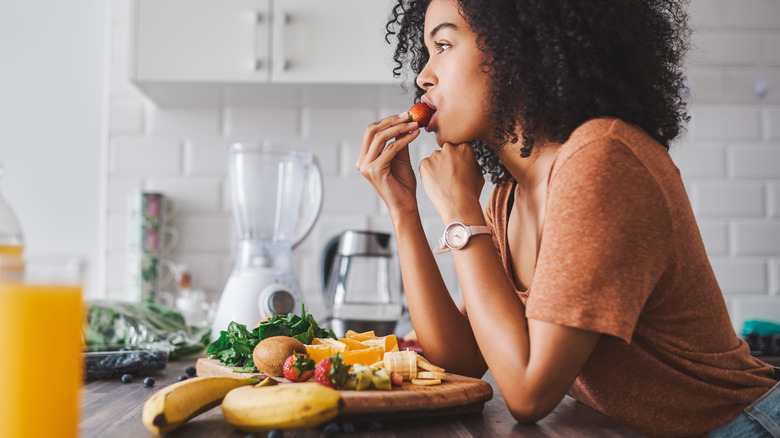Why You Should Think Twice Before Eating Diet Snacks On An Empty Stomach
An empty stomach is usually a cause for irritation, brain fog, and difficulty concentrating on your work. Come late morning or early afternoon, you might feel the rumblings in your belly signaling a need for food, after which you might not be able to think of much else.
Contrary to what some people might believe, snacking isn't as bad as you think it is. They are a great remedy for energy dips and may even prevent you from overeating at your next regular meal, per Harvard Health. A popular choice for snacking are those cutely packaged diet meals that we can find aplenty at gas stations, grocery stores, or the convenience store right down the street. We're talking about the 100-calorie packs of Oreos, cakes, chips, etc. According to nutritional experts, however, these are poor choices to mix with an empty stomach.
The goal with snacking is to gain a substantial nutritional boost from something small to get through the rest of your day, and these diet snacks don't really cut it in that respect. As explained by dietitian Julie Walsh to ABC News, "The problem with some of the snack chips is that there is not much nutrition [and] not much fiber. So you're not getting anything that's going to fill you up." However, this is not the only reason why diet snacks are a bad idea for an empty stomach.
Diet snacks are processed food
Don't be fooled by the packaging that gives the idea that you're eating something healthy. Diet snack packs are still processed food items (via Delish). Plus, cookies and other such food items are made with refined flour, notes WebMD, which is linked to weight gain, insulin resistance, and inflammation of the gut.
Anything processed also comes with the addition of preservatives like salt, sugar, and other ingredients to prolong shelf life and enhance flavor, per NHS. These can quickly add to calories, especially if you decide to pile on the snack packs on an empty stomach.
Since most of these diet packs are marketed as small treats, your instinct might be to buy more than one from the store. After all, the main reason you're snacking is to satiate your grumbling tummy, so if one doesn't do it, what's the harm in a few more? However, without even realizing it, you are increasing your overall calorie intake for the day.
What should you be eating on an empty stomach?
Simply put, avoiding anything processed would be the best way to go, and this might even involve packing a snack box for yourself before you leave home for the day. Slice up some fresh fruits and vegetables when you're preparing meals in the morning and bring them with you to work. While there might be some controversy over whether or not you can have fruits on an empty stomach on the internet, according to registered dietitian nutritionist Elizabeth Shaw (via Eating Well), this is not something you should be worried about if you're generally healthy.
Other healthy yet nutritious snacks you can include in your diet are cucumber or carrot slices with hummus, mixed nuts like trail mix, peanut butter on wholegrain toast, boiled eggs, avocado on brown toast, oatmeal, or cheese with crackers. And whatever you do, think twice before drinking coffee on an empty stomach. For beverage choices, stick with something light and nutritious like coconut water or even a vegetable juice, per Healthline. Plain old water works fine too.
If you're purchasing any of these snacks from the store, the important thing is to review the label, look for additions like preservatives, salt, and sugar content, and make mindful choices. It might take some detective work to weed out the truly healthy snacks from other not-so-healthy processed treats.


